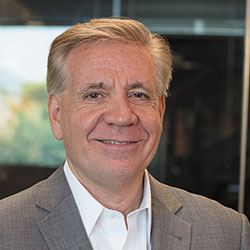The COVID-19 pandemic has everyone operating at more than arms length these days, but a new Arizona State University-sponsored webinar series is offering a twist on the social hour.
“Social-Distancing Socials” is a biweekly series of interactive conversations via Zoom courtesy of Future Tense, a partnership between Slate, New America and ASU. Together they will examine new emerging technologies, public policy and society.
The idea is to stay connected through technology from the comfort of your home — and perhaps with your favorite beverage in hand.
The series launched on March 19 and continued on Tuesday with “Running a University During a Pandemic” featuring Christopher Callahan, dean of ASU’s Walter Cronkite School of Journalism and Mass Communication.
Christopher Callahan
Callahan said that while this crisis has been challenging for faculty, staff and particularly journalism students, they are persevering in an unprecedented time.
“As we start to see this unfold, we’re seeing students become adaptive and showing how nimble they can be,” Callahan told Future Tense editor and webinar host Torie Bosch. “We’re also seeing students who are persevering and getting the story no matter what. And when you think about those dimensions of a potential employee — adaptability, creativity and perseverance — you can argue those are the three most important elements for any employee in the 21st century.”
The Cronkite School’s founding dean had high praise for his faculty and staff, who had less than a week to transition and design 193 journalism courses to an all-virtual-learning format.
“It was so inspiring to see some of our faculty members, some of whom had online experiences, immerse themselves in this new world to become experts in a remarkably short period of time,” Callahan said. “By 7:30 Monday morning (March 16), we were rating them.”
By rating them, Callahan meant that he, his IT team and staff had set up a command center on the fourth floor of the Cronkite School to monitor every class set up through Zoom.
“That gave us the ability to see who was doing well and who was struggling, and we were able to adjust that in real time,” Callahan said. “The part that surprised me the most was the majority of our faculty were off and running.”
And so were the students.
Callahan said even though the Cronkite curriculum is built around technology and working in the field, his learners have had to adjust. They are now writing from their homes, apartments or their dorm rooms, relying on technology to report their stories. Despite the limit of personal human interaction, he said strong stories have emerged from his students, who have also demonstrated great creativity in the face of the COVID-19 virus.
“In a weird way, this is actually going to be a benefit to some of our students,” Callahan said. “When they go out and talk to editors around the country, they can not only show their great storytelling, but how they did it facing these unbelievable challenges and restrictions.”
Social Distancing Socials calendar
Thursday, March 26: Not Exactly the Best Time to Ration Kids’ (or Your) Screen Time?
Hosts: Dan Kois, editor, Slate; Lisa Guernsey, director, Teaching, Learning, and Tech Program, New America
Tuesday, March 31: Is Self-Quarantine the Fabled Future of Work?
Hosts: Henry Grabar, staff writer, Slate; Brigid Schulte, director, Better Life Lab, New America
Thursday, April 2: When Crises Unleash Your Imagination
Hosts: Ed Finn, director, Center for Science and the Imagination, ASU; Torie Bosch, editor, Future Tense
Tuesday, April 7: Can We Still Say the Human Race Has Never Had It This Good?
Hosts: Andrés Martinez, editorial director, Future Tense; Charles Kenny, senior fellow and director of technology and development, Center for Global Development
More Law, journalism and politics

How ASU is leading the national conversation on journalism and AI
As artificial intelligence continues to advance at a rapid pace, journalism faces both unprecedented opportunity and profound responsibility.At Arizona State University, those challenges are being…

5 takeaways about artificial intelligence and elections
Next year’s midterm elections are happening at a crucial time in the adoption of AI, with concerns that the new technology could pose threats to the process but also have the benefit of easing the…

ASU dominates Rocky Mountain Emmys, showcasing range of talent
Arizona State University stole the spotlight at the Rocky Mountain Southwest Emmys, walking away with an impressive haul of shiny new awards and plenty of bragging rights.University-affiliated…

